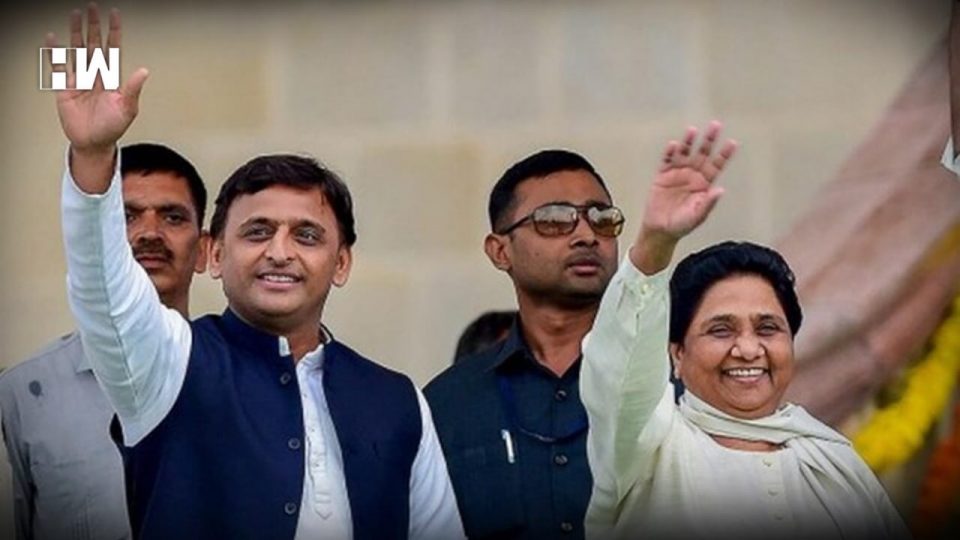Lucknow | The Samajwadi Party came off worse than its coalition partner BSP as the caste arithmetic by the gathbandhan in Uttar Pradesh failed before a BJP wave in the Lok Sabha elections.
Despite its high expectations from the alliance forged with Mayawati’s Bahujan Samaj Party this time, the SP got just five seats – the same number it won in the 2014 elections.
But its vote share fell four percentage points, from 22.35 per cent then to a little under 18 now.
In contrast, the BSP which drew a blank last time won 10 of the 38 seats it contested under the seat-sharing pact this time.
Adding the lone seat won by the Rashtriya Lok Dal, the third ally, the total seats bagged by the opposition coalition are a mere 15 out of the 80 in the state.
The Bharatiya Janata Party and its ally Apna Dal (S) won 64, compared to the 73 they had won in 2014, a performance which went against what the SP-BSP-RLD ‘gathbandhan’ was predicting.
Analyst Rakesh Pandey attributes the alliance defeat, in part, to its inability to wean away the non-Yadav OBCs, Jats, upper castes and Dalits who had switched to the BJP last time.
He also felt that many beneficiaries of the central welfare schemes — cooking gas connections, rural housing, toilets and the annual Rs 6,000 allowance to poor farmers — were part of the SP-BSP vote bank.
They have shifted allegiance to the BJP, he argued.
The SP even lost in the Yadav bastions of Kannauj and Badaun, indicating that even members of these castes had moved to the BJP.
This is the second time that an alliance experiment by Akhilesh Yadav has failed.
In the 2017 assembly elections, Akhilesh Yadav forged an alliance with the Congress against the wishes of his father and party founder Mulayam Singh Yadav. The SP tally had then come down to 47 from 224 in 2012.
When Akhilesh Yadav formed a coalition with the BSP this time, his father openly expressed disapproval over the idea of giving “half of the seats” to a partner.
Luck did not favour even the Yadavs’ own family.
Except Mulayam Singh Yadav and Akhilesh Yadav, contestants from the family failed to re-enter the Lok Sabha
Akhilesh Yadav won with a comfortable margin of 2.60 lakh votes, defeating Bhojpuri star and BJP candidate Dinesh Lal Yadav Nirahua. Mulayam Singh Yadav won in Mainpuri by over 94,000 votes, defeating BJP’s Prem Singh Shakya.
But Akhilesh Yadav’s wife Dimple and cousins Dharmendra and Akshay did not make it to Parliament.
In Firozabad, Akhilesh Yadav’s estranged uncle and founder of Pragatisheel Samajwadi Party-Lohia, Shivpal Yadav, was relegated to the third spot, securing about 91,000 votes.
But an SP leader claimed had Shivpal Yadav not parted ways with the party, he could have easily won.
Like Akhilesh Yadav, Mayawati took a big risk in becoming part of the coalition.
The BSP chief not only joined hands with arch-rival SP but also campaigned for one-time sworn enemy Mulayam Singh Yadav in Mainpuri, asking her supporters to forget past bitterness.
But she apparently failed to ensure that the core BSP voters transferred to the Samajwadi Party, wherever an SP nominee was fielded as a joint candidate.
The alliance had high expectations from the elections as the joint rallies held all over the state drew large crowds.
It also gave strength to Mayawati’s apparent prime ministerial aspirations, now shattered due to the poor performance of opposition parties nationwide.
During an election rally in Ambedkarnagar, the BSP chief even said, “If all goes well, I may have to seek election form here because the road to national politics passes through Ambedkarnagar.”
In 2009, the BSP had won its highest ever number of Lok Sabha seats, clinching 20 from UP. In 2014, it won none.
The Rashtriya Lok Dal, the smallest partner of the alliance, raised its vote share marginally from 0.86 per cent last time to 1.67 per cent now. But this did not translate into any seats.
The party was allotted three seats under SP-BSP-RLD pact.
Its president Ajit Singh lost in Muzaffarnagar, his son Jayant was defeated in Baghpat and Narendra Singh was humbled in Mathura by actor-turned-politician Hema Malini of the BJP.
As an independent media platform, we do not take advertisements from governments and corporate houses. It is you, our readers, who have supported us on our journey to do honest and unbiased journalism. Please contribute, so that we can continue to do the same in future.

